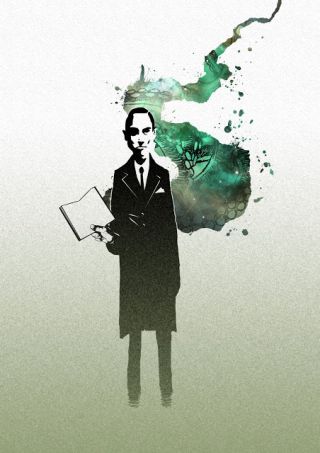
H. P. Lovecraft warns us against knowing too much
"The most merciful thing in the world, I think, is the inability of the human mind to correlate all its contents. We live on a placid island of ignorance in the midst of black seas of infinity, and it was not meant that we should voyage far. The sciences, each straining in its own direction, have hitherto harmed us little; but some day the piecing together of dissociated knowledge will open up such terrifying vistas of reality, and of our frightful position therein, that we shall either go mad from the revelation or flee from the deadly light into the peace and safety of a new dark age."
H.P. Lovecraft, "The Call of Cthulhu"
Centaurs, Trolls and Tentacles, Oh My!
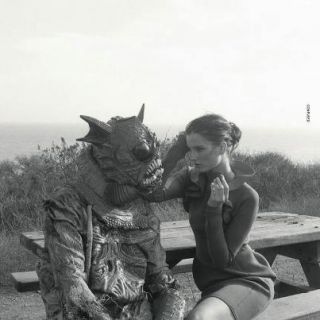
So, is there a Mrs Creature-From-The-Black-Lagoon?
Despite David Cameron’s best efforts you really can find anything on the internet. This includes the growing genre of monster porn—largely female generated sexual content featuring an array of beasties magical, mystical, and downright odd. I have posted before on why female generated porn is the closest thing we have to mind reading about female sexuality. However, some—such as John Horgan--think that this offers, not a window into human nature, but a challenge to the very idea of there being such a thing as human nature.
There are two types of critics of the application of the natural sciences to human beings.
“You’re doing it wrong”
The first type of critic understands and respects biology and, from this respect, grows a perfectly reasonable fear of misapplication. The irascible Jerry Coyne exemplifies this type. Constantly critical. Hard to please. Folk like him drive science forward—sometimes accompanied by the sound of gritted teeth--but the direction is generally a good one.
“You shouldn’t be doing it at all”
The second type of critic either has not taken the trouble to understand biology or, worse, understands it only enough to realize that certain ideologies cannot coexist with it. These critics fear that “correlating all the contents” of the human mind will “open up terrifying vistas of reality.” Religious and political ideologues fear, with some justification, that “no plan survives contact with the enemy”.
Alas, here the only “enemy” here is reality. Recently John Horgan exemplified this approach in his Scientific American Post on monster porn. I hope the fact that he used a blatantly creationist strategy to attack an entire field of science of which he disapproves might give him the tiniest pause for reflection. Let’s see.
“It’s symbolic of his struggle against reality”
“What use is half an eye?” the creationist used to squawk—confident that such a wonderful structure lay beyond the best efforts of natural selection to explain all the various phylogenetic stages of the eye (e.g. over deep time) as adaptive. In fact, patient work has revealed that the natural selection of eyes is one of the triumphs of the science. We have an organism that typifies each stage of development from light sensitive cells through to complex structures, along with sophisticated mathematical modelling that shows how eyes can evolve with surprising rapidity.
John Horgan essentially takes the same tack as the “what use is half an eye” strategy of the creationists. “What use is monster porn?” cries John Horgan, thinking that if we cannot explain why women fantasize about sex with “creatures of every possible variety, from minotaurs to mermen, cthulhus to leprechauns, extraterrestrials to Cyclops” then evolutionary psychology (and he also takes a pop at behavioral genetics here) is utterly flawed and useless.

I want you to be my Centaur-fold!
“Evolution is smarter than you are”
Orgel’s second rule captures how one individual’s lack of imagination is not a threat to the theory of evolution by natural selection. The response to “I can’t see how X evolved” should be “Well, try harder then.” Not, “Oh dear! That’s it for the science of evolution”.
Horgan has previous for this sort of thing: Hanging around on the fringes taking pot shots at targets of opportunity and claiming that if we can’t explain this particular thing that bothers him right here right now in a way he can understand this means that a whole science is flawed. Think I am being unfair or exaggerating? The message of Horgan’s 1997 The End of Science was that science is scary and we should basically stop doing it now we have enough toys to play with. Or, as the inimitable Lovecraft might have put it “flee…into the peace and safety of a new dark age”.
Put up or shut up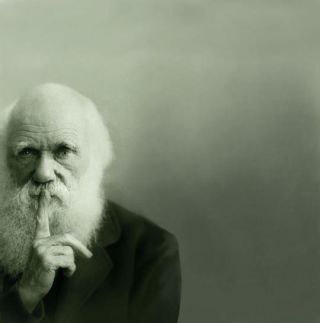

Put up or shut up
Evolution is way smarter than you are
We have seen this sort of thing before. Intelligent design proponents, realising that actually evolution can explain half an eye, and half a wing etc just fine--tried moving on to more abstruse things like blood clotting and flagella. “Here”, “they said “If you can’t explain how this tiny little piece of apparatus evolved—right now! Then that’s it for you evolutionists. Game over!”
Alas for them, adaptationist accounts did what they always do—increased understanding of the traits in question and suggested further lines of research to pursue. Flagella and blood clotting all fell to the universal acid of Darwinian selection, deepening our understanding of them in the process.
But the creationists are nothing if not stubborn. Desperate to preserve their world view creationists squirm on the hook and try to get the so-called controversy taught in schools or argue for separate magisteria of humans and the natural world. And now the religious creationists have some company.
Just growed stories
Opponents of evolutionary psychology are fond of misrepresenting adaptationist accounts as untestable “just so stories”, rather than as what they are: Tentative ideas drawn from a variety of empirical sources such as anthropology, neuroscience, comparative ethology, and behavioral ecology. These are intended to prompt hypotheses to test and complete the picture of the four elements needed for a complete biological explanation of a trait. Well, what do the opponents of evolutionary psychology have to offer in their stead? “Just growed” stories.
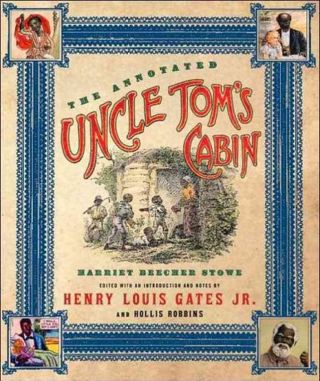
Just growed stories?
Topsy, the little orphan slave girl in Uncle Tom’s Cabin, is adrift and kept artificially without roots. Where asked where she came from she says that she suspects that no-one made her, she “just growed”. The opponents of evolutionary psychology offer similarly rootless and untestable hand waving in lieu of explanation.
Where did this trait come from? Nowhere, It “just growed”?
Why is there a constant and measurable variance between this population and that? No reason. Differences, “just growed”.
Why does this trait have the particular features and flaws that it does? No reason. It “just growed”.
At least the religious creationists offered us some magic.
History is just one damned thing after another
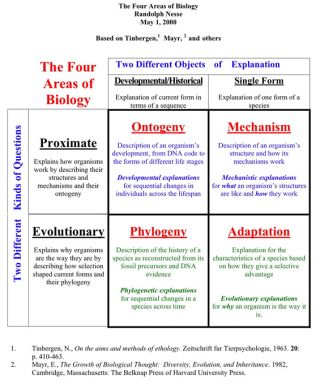
For wanna-be science writers to cut out and put on their wall
Well, it’s put up or shut up time. A merely historicist account, like Horgan alludes to, needs to show why—at a minimum--some patterns of behavior recur more than others, why a trait keeps occurring across separated cultures, and why certain traits are acquired so rapidly, with minimal input, and with great resistance to extinction. I’m sorry to have to point out this obvious truth but saying it “just growed” will not do. It offers us nothing to test.
With no sense of irony, Horgan suggests that his “favourite sexologist” is Jesse Bering who--according to Horgan--just looks to childhood experiences to explain sexuality. Bering is, of course a well-known and respected evolutionary scholar who has written popular books like The Belief Instinct (an evolutionary account of religion) and Why is the Penis Shaped like that? (a review of evolutionary accounts of human sexual traits).
Bering in minds
Bering knows, as every good biologist knows, that an adaptationist account is in no way in opposition to a developmental one. Rather, he would see that “how” and “why” questions are mutually supportive and explanatory. The fact that Horgan seems to have missed this first year undergraduate truism suggest that he has been simply skipping class. And, dare I say, not actually reading Bering’s books? (Perv is good too).
Evolution is smarter and pervier than you are
Like Pilate who asked “what is truth” and then didn’t hang around for an answer—I dare say Horgan has left this page by now—if he was ever here. But, for any readers still with me, I will suggest what an adaptationist might have to say about monsters in general and monster porn in particular. Monstrare comes from the Latin “to show” and monsters show us something about ourselves.
Rampant rabbits? And mammoths…
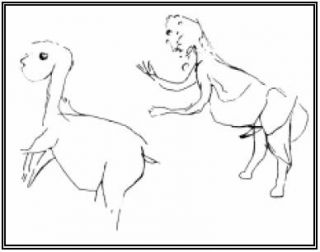
Why wasn't this on the tour?
The first thing to note is that monster porn is by no means novel. Three hundred meters into the Combarelles caves in the Dordogne, France, an 11000-year old ancestor saw fit to depict a human having sex with some sort of equine. Ancient dildoes going back 20000 years are adorned with pictures of various potent animals. And, we don’t need to be too intrepid to see the largest depiction of bestiality and gang rape ever produced by human hands. Just take a look at what the Centaurs are trying to do to the Lapith women on the metopes of the apotheosis of European architecture—The Parthenon, parts of which are in the British Museum.
Contemporary hunter-gather groups have raucous festivities involving symbolic sex with humans dressed as animals and these go back as far as records begin. Not far from where I work there is an annual festival at which the Queen of the May symbolically marries King Puck (yes, you read that correctly) an icon of animal potency and fertility. In the UK symbolic animals grab innocent maidens off the streets with impunity during May festivities.
Daddy, I’ve fallen for a monster
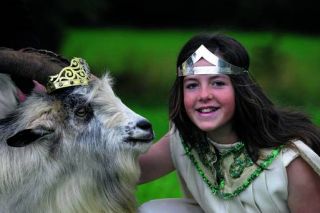
King Puck and his new wife
What do things like Bigfoot, Cthulhic monsters, magical beings, werewolves, vampires and centaurs have in common? Well, to someone not wedded to a creationist psychology might I venture one or two themes of adaptationist relevance?
Power. Potency. Transgressiveness. Loss of control. Outbreeding. The evocation of uncontrollable desire. Dominance. Submission. Rescue. Heroes. Villains. Large penises. Do these sound like themes irrelevant to biology or reproduction? If so, then it’s time to go back to school.
What hypotheses might be generated from all these themes? I don’t know. Exciting isn’t it? That’s how science progresses—bold hypotheses, conclusive refutations. Looking at human fantasy through a Darwinian lens is something that we are just starting out on. And it might easily turn out that the prevalence of these fantasies has no adaptive function—they might be by-products of other adaptations. Not everything is an adaptation. Every first year biologist knows this.
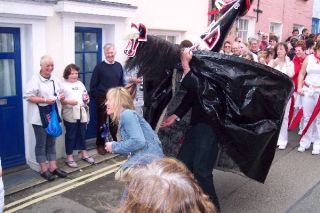
Mayday! Mayday!
Gooble-gobble, we accept you, one of us.
The irony of all of this is that Darwinian literary studies is just getting into full swing. Humans are story-telling animals par excellence and our story telling is going to turn out to be as intimately connected to our nature as our language skills. Journals like Evolutionary Behavioral Sciences are publishing articles on these issues. Books like The Literary Animal, The Story Telling Animal, The Art Instinct, and Graphing Jane Austen are already exploring these and many other themes with novel testable predictions undreamed of in humanities departments that reject Darwinism. If Horgan wanted to lend his literary talents to this endeavour then he might become part of the solution—rather than part of the problem.
Adaptationist accounts seek to deepen our understanding of human psychology and fantasy is a primary window into studying this. Some of these predictions will be supported, some will be rejected. The best will lead to further studies and deeper understanding of the human nature. Fantasies might be by-products of other adaptations--causing delight through vicarious experience or simulating gossip. Or, they might have adaptive function in their own right--perhaps by providing dry-runs of possible interactions.
These are all different adaptationist predictions--testable in all the usual ways. For example for fantasies to be adaptive cognitive dry-runs they would probably track local socio-cultural norms or be analysable in terms of game theory. My bet, for what its worth, is that predictions supporting a by-product model are more likely to be supported--but fantasies will be no less important in our understanding of human nature for all that!
One prediction I am confident in. No progress will be made by those who do nothing but stand on the side-lines scoffing.
References
Bering, J. (2012). The belief instinct: The psychology of souls, destiny, and the meaning of life. WW Norton & Company.
Bering, J. (2013). Perv. Random House.
Bering, J. (2009). Secrets of the Phallus: Why Is the Penis Shaped Like That. Scientific American.
Carroll, J., Gottschall, J., Johnson, J. A., & Kruger, D. J. (2012). Graphing Jane Austen: The evolutionary basis of literary meaning. Palgrave Macmillan.
Dennett, D. C. (1996). Darwin's Dangerous Idea: Evolution and the Meanings of Life (Vol. 18). Penguin UK.
Dutton, D. (2009). The art instinct: beauty, pleasure, & human evolution. Oxford University Press.
Gottschall, J. (2012). The storytelling animal: How stories make us human. Houghton Mifflin Harcourt.
Gottschall, J., & Wilson, D. S. (Eds.). (2005). The literary animal: Evolution and the nature of narrative. Northwestern University Press.
King, R. (2013). Just growed stories. Journal of Evolutionary Psychology, 11(3), 155-157.
Nilsson, N. J. (1995). Eye on the Prize. AI Magazine, 16(2), 9.
Stowe, H. B. (1852). Uncle Tom's Cabin: 1852. Tauchnitz.




